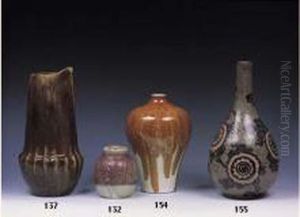Emile Lenoble Paintings
Émile Lenoble was a French ceramicist renowned for his innovative approach to pottery and his influence on the art of ceramics during the early 20th century. Born in 1875 in Châteauroux, France, Lenoble was initially trained in the decorative arts. His early career saw him exploring various artistic disciplines, but he soon found his true passion in the art of ceramics.
Lenoble's work was characterized by a combination of traditional craftsmanship and modernist aesthetics. He was heavily influenced by ancient pottery, particularly from the Mediterranean region, and he often sought to reinterpret these classical forms within a contemporary context. His ceramics often featured simple, robust forms with a focus on the tactile qualities of the clay and the subtle effects of glazes.
Throughout his career, Lenoble remained dedicated to the craft of pottery, advocating for the recognition of ceramics as a fine art rather than merely a decorative or utilitarian craft. He was a member of various artistic circles and collaborated with other artists and ceramists of his time, contributing to the dynamism of the Parisian art scene.
Despite the challenges of the two World Wars, Lenoble continued to produce work and exhibit throughout his life. His pieces were well-received, and he garnered respect from both critics and collectors. Today, his work is considered an important bridge between traditional pottery techniques and the modernist aesthetic that would come to dominate the art world.
Émile Lenoble passed away in 1940, leaving behind a legacy that continues to influence ceramic artists. His dedication to the medium helped elevate the status of pottery and inspired a renewed appreciation for the art and craft of ceramics. His works are held in many private collections and museums, where they continue to be celebrated for their beauty and craftsmanship.
